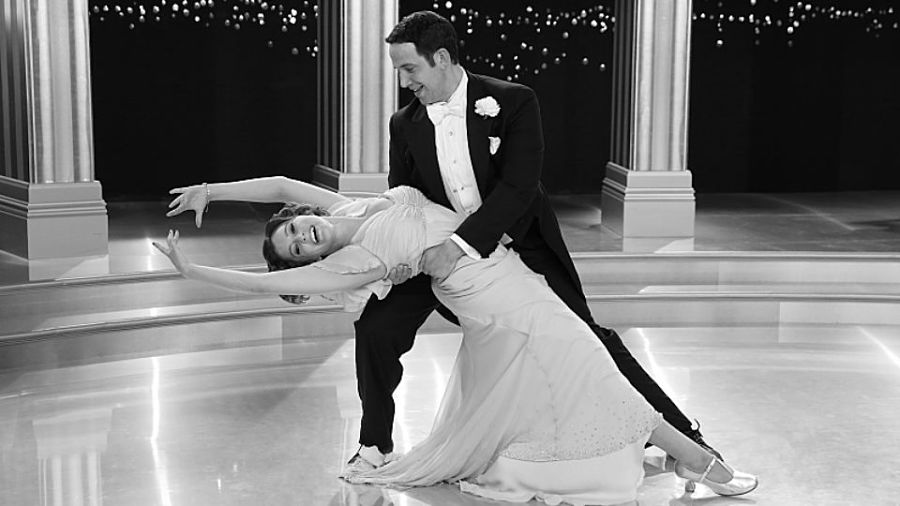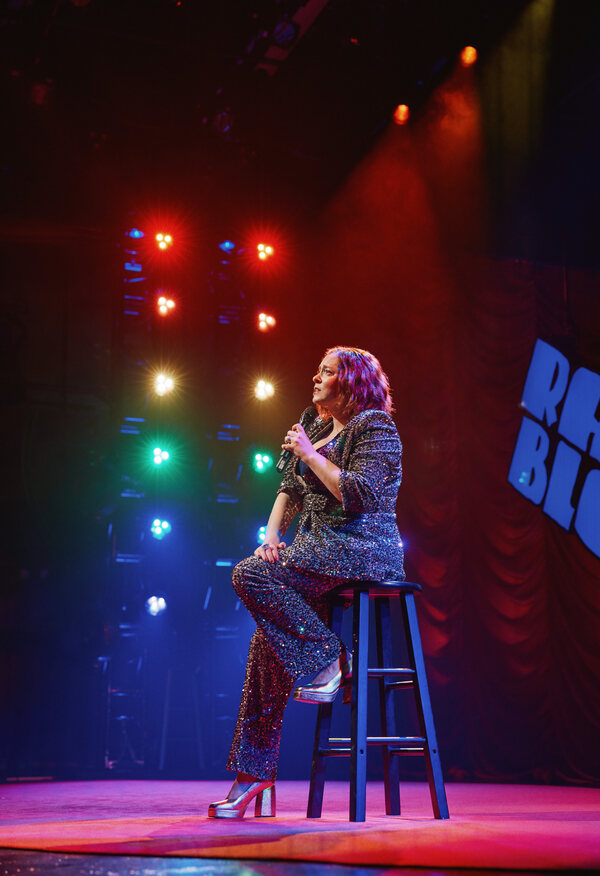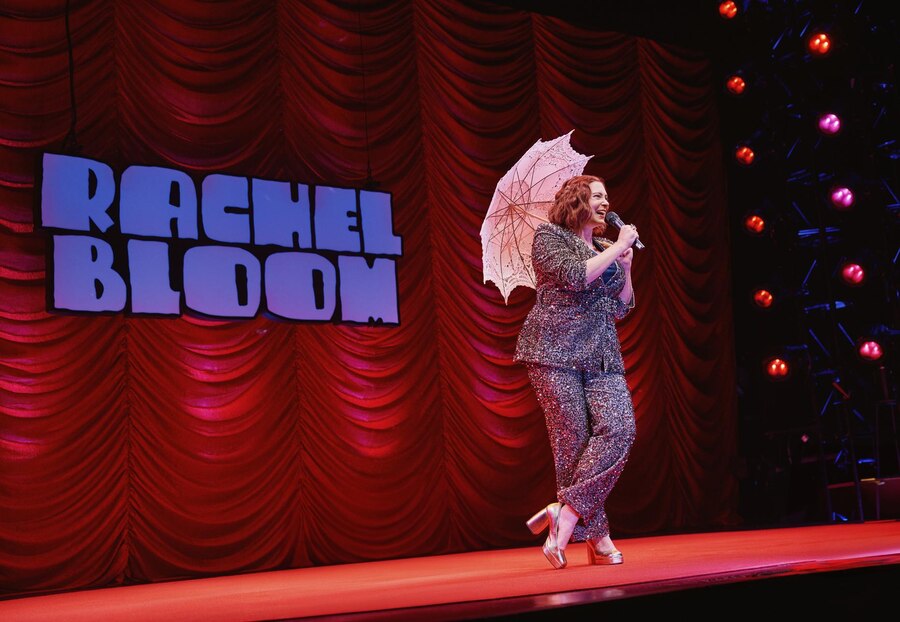America is pretending like it’s 2019. Public gatherings have surged back to life; masks, even in cities like New York, have become a rare subway oddity; two elderly men named Joe and Don prepare for another geriatric battle royale. And at the Lucille Lortel, multihyphenate actor-writer-lyricist-comedian-TV star Rachel Bloom has gotten into the spirit of things with her semi-new, semi-recycled one-woman show.
“I wrote this show in 2019,” the Crazy Ex-Girlfriend co-creator and star explained in a recent interview, soon before technical rehearsals began (the show opens tonight). When the opportunity came last year to return to the piece, “I tried to fit in a lot of those jokes that I’d been working on pre-pandemic.” But Bloom, a relentless craftsperson, quickly found that those bits no longer fit. “The pandemic was a pandemic because people died,” she said bluntly. (Bloom may be hyperverbose, but she’s masterful at articulating just what she means.) “I think everyone had mass trauma, but the cause of that trauma was mass death.” Which is why she’s named the performance—a mixture of stand-up, solo show, and song—Death, Let Me Do My Show.
In a lesser creator’s hands, trauma, viral plague, and the inevitability of death might make for a downer of an evening. But that’s the art of Bloom, the genius behind her screwball charm. Since she first garnered attention 13 years ago with the raunchily brilliant “Fuck Me, Ray Bradbury”—a music video in which she played a profane, pigtailed high schooler who fantasizes about the sci-fi god—Bloom has succeeded in excavating the weirdest, darkest parts of herself and putting them not just onstage or onscreen, but to music. In her 2010s YouTube heyday, the artist perkily performed a dance-instructional-video-slash-descent-into-OCD and parodied pop nihilism with a song about how she would literally “Die When I’m Young.” On Crazy Ex-Girlfriend, she—along with co-creator Aline Brosh McKenna, songwriters Jack Dolgen, Adam Schlesinger, and Dan Gregor, and one of the most talented acting ensembles on TV—took on the institutions, fantasies, and toxicity of romantic love.

Death, Let Me Do My Show dramatizes (and comedicizes) Bloom’s process of killing the show’s initial 2019 draft and generating a new version, as she moves from blithe denial to angry dismissal to arid despair to creative rebirth. In the end, her inspiration comes not from what’s funniest but from what’s most difficult to talk about. Just like it always has.
“It’s very personal,” Bloom said of Death. “I’ve worked very hard on it. This show is like…it’s me.” The vulnerability she feels isn’t owing to the work’s ultra-personal content, she explained. (Truly, Bloom has never met a cultural taboo she didn’t gleefully snap like a bra strap—in fact, Death, Let Me Do My Show is the first live performance of hers I’ve seen that didn’t involve wholesale bra removal.) Rather, her feeling of exposure comes from her autonomy. “I have a director [Seth Barrish] and I have co-songwriters. But at the end of the day, every choice in the show is mine.”
To hone the material, Bloom spent more than a year on tour (the show was then called Death, Let Me Do My Special), refining her performance down to a tight, faux-loosey-goosey 85 minutes. After two years of lockdown and many years on TV before that, she said she needed that time on the road to reacclimate to live performance.
“I find audiences are very interesting,” she said. “There are always gonna be the things I know that are gonna get laughs. But it really depends on the audience and the time of day that the show is, and even the day of the week, what the vibe is. So that always changes. It’s a show that fundamentally is about the relationship of the person onstage with the audience.”
At the beginning of Death, Let Me Do My Show, however, there’s little sign of the veteran artist in Bloom’s performance. Although, as she shares in the piece, she received a B-minus in Experimental Clown, the performer returns here to a character she’s perfected over her years in the public eye: the anti-virtuoso, flawed, bumbling, and a little foolish, who buffoonishly throws basketballs, tells stories about sharting (if you click that link, I’m sorry), and clomps around in too-high golden heels until finally kicking them off because “my feet fuckin’ hurt.” Though the show and its stories are largely autobiographical, Bloom acknowledges that she’s playing a character—”especially in the first part,” when she’s “performing a version of me that doesn’t want to do the show,” who yearns instead to return to the heady days of late 2019 and early 2020, when she danced, mask-free and eight months pregnant, in a club. As the story progresses and deepens, she said, the balance between performance and self remains “a mix. It’s me playing myself. But I’m also playing like I haven’t told this story before. I am playing a little bit of a past version of myself. It’s trippy.”
In addition to dance-y antics, that past version of Bloom had not yet given birth to a daughter (whose privacy this ostensible oversharer guards fiercely), nor spent time in the NICU, wiped down every ID in her wallet with Clorox, or seen her unflappable OB-GYN cry. Nor had she yet suffered the loss of songwriting partner Adam Schlesinger, whose death in the first weeks of the pandemic devastated Bloom. This absence plays a major part in the show—not only in what’s onstage, but in how it’s crafted.
“Ultimately, I’m trying to make a show that Adam would like,” Bloom said. “I think that’s where some of the unsentimentality comes from. I can’t use his death to make something weepy and saccharine. He would hate that. He was a very unprecious person.” Bloom’s songwriting, too, has shifted since losing Schlesinger. “I wrote music before I met Adam, right?” she said. “But where I felt gaps was in the songwriting. I’m a lyricist with a capital L, and a composer with a small c. And if Adam had been alive, I would have just been working with Adam on every song.”
Instead, Bloom has turned to a rotating cast of co-composers (among them Eli Bolin, Alden Derck, Jack Dolgen, and Shaina Taub) to help populate Death, Let Me Do My Show with her trademark musical parodies, many of which are so funny, or so disgusting, or both, that she’s compelled to wait for howls of laughter to subside before moving onto the next line.
“My comedy special was always gonna have music in it,” she said, but it’s now become more of “a stand-up show meets one-act musical.” She tracks this progression through the show itself, which starts with a sung “pastiche of a 1920s musical” that centers an unholy mixture of flora and ejaculate (a song inspired, Bloom explained, by such antecedents as the 1935 Noël Coward number “Don’t Put Your Daughter Onstage, Mrs. Worthington” and Irving Berlin’s 1914 “If You Don’t Want My Peaches, Don’t Shake My Tree”). By show’s end, though, Bloom plants herself onstage and belts out sincere-yet-uproarious songs that “bubble up more spontaneously…through emotion.” Even these more serious numbers, she argued, have an escapist function. “I think songs always have an escapism to them, because you’re singing,” she said. “There’s a joy in it. Even in something like Next to Normal or Sweeney Todd, there’s always going to be a heightened adrenaline when you’re listening to songs. With that also, I think, comes a heightened emotion.”

Happy-sad, profane-profound, genius-clown—these dynamic contradictions have long electrified Bloom’s work. In Death, Let Me Do My Show, she goes a step further, exposing a deeply personal tension: her principled atheism versus an increasingly desperate search for meaning. To longtime fans, Bloom’s ambivalence toward religion might come as a surprise. On Crazy Ex-Girlfriend, she played a 21st-century archetype of an East Coast Jew, whose mother caterwauled “Where’s the bathroom?” while uttering cutting critiques (Tovah Feldshuh), and whose rabbi exhorted her to “Remember that we suffered” (Patti LuPone). But, Bloom said, much of that material “came from other people’s lives, from [co-creator Aline Brosh McKenna’s] life. I think people assume I am an East Coast Jew who had a bat mitzvah. The reality is, I grew up in Southern California, I quit Hebrew school when I was 9, and my parents didn’t care.” Jewishness, she perceived growing up, “wasn’t even a cultural thing, so much as something else that made me different, and alternative to that Southern California beach lifestyle. Like, my family was always worried about health. When no one else was talking about wearing sunscreen, we’d be the ones in the hats on the beach. Is that because we’re Jewish? Or is it just because we’re different?”
Even after she’d recorded a Chanukah album, Bloom shared, she still felt “something of an inferiority complex” on the subject. But with Death, Let Me Do My Show—in which she admits that the only prayer she can recall in a moment of profound stress is the blessing for the menorah—Bloom gets to “explore my actual relationship to Jewishness.” Throughout the show her atheism waxes and wanes as she searches for ghosts, conflates her psychiatrist with God, visits a psychic who pitches her two TV shows, and begs the cosmos for answers. “There’s something very Jewish to being an atheist,” she posited. “I think, actually, that there are a lot of contradictory things about identity that I still feel with Jewishness. But I feel like I’m slowly doing the work, and asking: Where does my feeling different begin and feeling Jewish end?”
Another paradox of Bloom: that she’s at her most appealing when acknowledging this persistent sense of difference, and at her most relatable when disclosing feelings of alienation. “I miss myself,” she said of the 2019-to-2023 time traveling act she’s now performing nightly. “I think we all miss ourselves in 2019, in a way.” It’s this blend of nostalgia and grief, envy and agony, that throbs at the heart of Death, Let Me Do My Show—a mixture of emotions that Bloom is uniquely qualified to embody. She understands the tonal difficulties of mixing comedy with profundity, and backs up the big emotions her show elicits with a minute attention to detail. Even the choice to put “death” in the title of her show was a calculation: “It was important, I think, to give people an inkling that what they were about to see wasn’t just super sunny and happy.”
But while the process of writing and performing has sometimes proved therapeutic, Bloom never mistakes art for therapy. “There’s nothing that I’m sharing ever in this show,” she said, “that I haven’t talked about with my husband, talked about in therapy, talked about with friends.” That processing happened offstage, artlessly and privately. What Bloom’s giving us now is the aftereffect—the product.
Which is not to say that Death, Let Me Do My Show lacks authenticity, spontaneity, or heart. Bloom’s raw—very raw, often drenched or caked in mucus, poop, and breast milk—expressions of love for both her daughter and her dog, Wiley, constitute the show’s most meaningful elements, antidotes to the random, ravening destruction of the pandemic. In fact, when I shared that I’d found the word “trauma” four times in Bloom’s working script, but the word “dog” 46 times, Bloom expressed delight, but not surprise. It’s important, she explained, not to be heavy-handed, and to understand that dogs and daughters are just as important as death.
Bloom’s adoration for her pet plays a major part in the show’s resolution—a denouement too good to spoil, which blends the performer’s sense of humor with cosmic revelation. This climactic moment is based on an actual realization Bloom had two years after the pandemic’s start, during a beach vacation. As she floated in the sea, thinking about death (as she often does these days), she realized, “I could be drowned right now. The ocean is so much bigger than me. If the ocean wanted to drown me, it could. And rather than feeling fear, I was like—no, no, it would suck, but it’s okay. Even if there’s nothing after, it’s okay.”
The sense of an unfeeling universe—of incalculable vastness combined with unbearable meaninglessness—drives today’s desperate, amnesiac denialism. But Bloom, at least, refuses to live in the past. True, every night, she’s resurrecting 2019 Rachel. And every night she’s letting her die.
Gabrielle Hoyt is a dramaturg, writer, and director. She is pursuing her MFA at Yale. @gabhoyt


